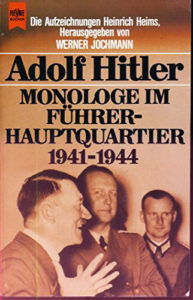For the context of these translations click here,
for this monologue in German, here.
Part One: Table talks # 1-74
– 5 July to 31 December 1941 –
Führer Headquarters Saturday, 5 July 1941
 What we lack, he said, is a clear presentation of the will to live, the way of life of der Völker [the Germanic peoples]. The difference between the fascist and the Russian people’s movements is that the fascist involuntarily followed the path of the old Roman community formation, while the Russian tended in the direction of anarchy.
What we lack, he said, is a clear presentation of the will to live, the way of life of der Völker [the Germanic peoples]. The difference between the fascist and the Russian people’s movements is that the fascist involuntarily followed the path of the old Roman community formation, while the Russian tended in the direction of anarchy.
The Russian does not, by nature, strive for higher forms of community. The people can also live in such a way that there is no grouping of family units into a whole; if Russia has a state form in the occidental sense, it’s merely the result of coercion.
In a certain sense all human culture, the beautiful, is a result of coercion, of what we call education; but the Aryan peoples have a disposition to activity. A man like Krümel[1] is active from morning till night, another is always thinking; the Italian is industrious as a bee; for the Russian, the highest cultural creation is vodka, the ideal: to always do only what is necessary. Work in our sense and even more work, such as an Aryan might demand from him, are a nuisance to him.
It is questionable whether one can get along in Russia without the priest; the Pope has comforted the Russian about the fact that he is condemned to work; in return, he will be well off in the afterlife. The Russian will work if he is under an iron organisation, but he is unable to organise himself. Only the drop of Aryan blood in individual veins is what has given the Russian people inventions and state organisation.
A just regime belongs to the strong hand of rulership, who presupposes this in every leadership. But just as the horse, if it isn’t constantly kept in check, throws away all training in a flash—in America a few horses had run away and a few decades later the country had enormous herds of wild horses. The horse found its way back to nature so quickly, so the primal urge to return to nature is also always present in the Russian. For him, these are the forms of life in which the family exists. Like a mother hare, the Russian will care for her children with everything that belongs to motherhood. But that’s all the Russian wants. His rebellion against the coercion of state organisation—and it always means coercion because it curtails the freedom of the individual—is brutal and blindly cruel, as is always the reaction of the women. If he fails in this, he breaks down in self-recriminations; it is in these revolutions that he strives back to nature. Thus nihilism remains the form of his revolution.
The boss also said:
He believes that there was still oil in a thousand places; in the case of coal, we know how the coal reserves decrease: cavities form. When it comes to oil, we don’t know whether the cavities won’t fill up again from reservoirs invisible to us.
Man is perhaps the most dangerous microbe imaginable. He takes the whole earth without asking whether there might be substances of vital importance for life in another region, which he looks with the microscope for the cause of devastation that is felt on the surface of the earth.
___________
[1] The cook in Hitler’s special train was known by this joking name.
One reply on “The Führer’s monologues, 1”
I find somehow his views on the Roman empire confusing.
For one hand, he seems to be praising their civilized/urbanite lifestyles (even thought that was the ultimate cause of their racial demise, if you know what I mean) and yet he also praises the Germanic people, which seems curious if we consider that the statue of Hermann in Germany is portrayed as having a Roman eagle under its feat, clearly celebrating his victory over the Romans.
I find interesting what he says about horses when they return to the wild. Isn’t that something to feel admiration from? Wonderful animals, indeed.
They find their own path once having broke chains from the civilized man.
Can you imagine the Germans of today throwing away all the liberal/American indoctrination in a flash after becoming free from the USA army occupation? Then returning to the countryside and becoming ,once again, the wild blonde beast that Nietzsche envisioned?